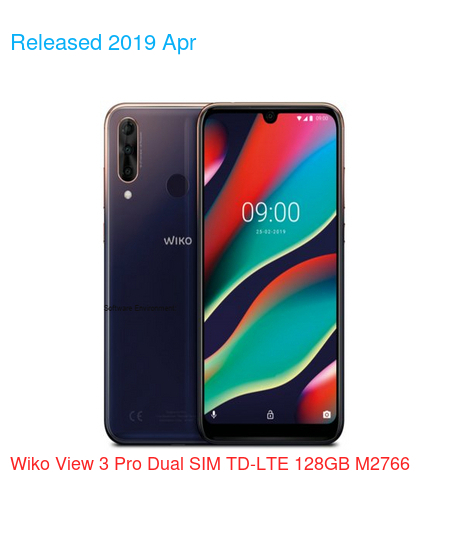| Brand | Wiko |
| Model | View 3 Pro Dual SIM TD-LTE 128GB M2766 |
| Released | 2019 Apr |
| Announced | 2019 Feb 27 |
| Hardware Designer | Wiko Mobile |
| Manufacturer | Shenzhen TINNO Mobile Technology |
| General Extras | Haptic touch feedback |
| Device Category | Smartphone |
| Width | 75 mm |
| Height | 159.5 mm |
| Depth | 8.1 mm |
| Dimensions | 2.95×6.28×0.32 inches |
| Mass | 184 g |
| Platform | Android |
| Operating System | Google Android 9.0 (Pie) |
| Software Extras | Voice Command , Navigation software , Augmented Reality (AR) , Intelligent personal assistant , Face Recognition |
| CPU Clock | 2000 MHz |
| CPU | MediaTek Helio P60 MT6771, 2018, 64 bit, octa-core, 64 Kbyte I-Cache, 64 Kbyte D-Cache, 1024 Kbyte L2, 12 nm, ARM Mali-G72 GPU |
| RAM Type | LPDDR4x SDRAM |
| RAM Capacity (converted) | 6 GiB RAM |
| Non-volatile Memory Interface | Yes |
| Non-volatile Memory Capacity (converted) | 128 GB ROM |
| Display Notch | 1-notch |
| Display Diagonal | 160 mm |
| Resolution | 1080×2340 |
| Horizontal Full Bezel Width | 7.95 mm |
| Display Area Utilization | 81.4% |
| Pixel Density | 409 PPI |
| Display Type | Color IPS TFT LCD display |
| Number of Display Scales | 16.8M |
| Scratch Resistant Screen | Yes |
| Graphical Controller | ARM Mali-G72MP3 |
| GPU Clock: | 800 MHz |
| A/V Out | No |
| Microphone(s) | stereo |
| Loudspeaker(s): | mono |
| Audio Output: | 3.5mm |
| Supported Cellular Bands | GSM850 , GSM900 , GSM1800 , GSM1900 , UMTS2100 (B1) , UMTS1900 (B2) , UMTS850 (B5) , UMTS900 (B8) , LTE2100 (B1) , LTE1800 (B3) , LTE850 (B5) , LTE2600 (B7) , LTE900 (B8) , LTE800 (B20) , LTE700 (B28) , TD-LTE2300 (B40) bands |
| Supported Cellular Data Links | GPRS , GPRS MSC12 , EDGE , EDGE MSC12 , UMTS , HSUPA , HSUPA 5.8 , HSDPA , HSDPA 7.2 , HSPA+ 21.1 , LTE , LTE 100/50 , LTE 150/50 , LTE 300/50 , LTE 400/150 data links |
| SIM Card Slot | Nano-SIM (4FF) |
| Complementary Phone Services | Voice transmission , Voice speaker , Vibrate , Speakerphone , VoLTE |
| SAR (head) | 0.610 W/kg |
| SAR (body) | 1.500 W/kg |
| Dual Cellular Network Operation | Dual standby |
| Sec. Supported Cellular Networks: | GSM850 , GSM900 , GSM1800 , GSM1900 |
| Sec. Supported Cellular Data Links: | GPRS , EDGE |
| Sec. SIM Card Slot | Nano-SIM (4FF) |
| Touchscreen Type | Capacitive multi-touch screen |
| Expansion Interfaces | TransFlash , microSD , microSDHC , microSDXC |
| USB | USB 2.0 |
| USB Services | USB charging , USB fast charging , USB Host , USB OTG 1.0 , USB OTG 1.3 , USB PD |
| USB Connector | USB C reversible |
| Bluetooth | Bluetooth 4.2 |
| Wireless LAN | 802.11b , 802.11g , 802.11n , 802.11ac |
| Wireless Services | Wi-Fi Tethering |
| NFC | NFC A , NFC B |
| FM Radio Receiver | FM radio (88-108 MHz) |
| Complementary Satellite Services | Simultaneous GPS , A-GPS , Geotagging , QuickGPS |
| Supported GLONASS protocol(s) | L1OF |
| Supported Galileo service(s) | E1 |
| Supported BeiDou system (BDS) | Yes |
| Camera Placement | Rear |
| Camera Image Sensor | CMOS |
| Image Sensor Pixel Size | 1.25 micrometer |
| Number of effective pixels | 12.0 MP camera |
| Zoom | 1.0 x optical zoom |
| Focus | PD AF |
| Video Recording | 1920×1080 pixel |
| Flash | dual LED |
| Camera Extra Functions | EIS (video) , HDR photo , Slow motion video , Burst mode , Macro mode , Panorama Photo , Face detection , Smile detection , Face retouch |
| Aux. Camera Image Sensor | CMOS |
| Aux. Camera Number of Pixels | 13.0 MP aux. cam |
| Aux. Cam. Min. Equiv. Focal Length | 16 mm |
| Aux. Camera Extra Functions | HDR photo , Burst mode , Macro mode |
| Aux. 2 Camera Image Sensor | CMOS |
| Aux. 2 Camera Number of Pixels | 4.9 MP aux. 2 cam |
| Aux. 2 Camera Aperture (W) | f/2.40 |
| Aux. 3 Camera Image Sensor | No |
| Aux. 4 Camera Image Sensor | No |
| Secondary Camera Placement | Front |
| Secondary Camera Sensor | CMOS |
| Secondary Camera Number of pixels | 16.3 MP sec. cam |
| Secondary Video Recording | 1920×1080 pixel |
| Secondary Camera Extra Functions | Pixel unification , HDR photo , Panorama Photo , Face detection , Face tagging , Smile detection , Face retouch |
| Sec. Aux. Cam. Image Sensor | No |
| Built-in compass | Yes |
| Built-in accelerometer | 3D accelerometer |
| Built-in gyroscope | Yes |
| Additional sensors | FP sensor , L sensor , P sensor |
| Protection from solid materials | Yes |
| Protection from liquids | Yes |
| Battery | Li-ion polymer (LiPo) |
| Nominal Battery Voltage | 3.85 Volts |
| Nominal Battery Capacity | 4000 mAh battery |
| Nominal Battery Energy | 15.40 Wh |
| Estimated Battery Life | 13.0 hours |
| Talk Time: | 36.0 hours |
| Market Countries | Algeria , Austria , Belgium , Cyprus , Croatia , Egypt , France , Germany , Greece , Ireland , Italy , Kenya , Netherlands , Nigeria , Poland , Romania , Saudi Arabia , Serbia , Slovenia , Spain , Switzerland , UK |
| Market Regions | Africa , Eastern Europe , Europe , Middle East , Western Europe |
| Mobile Operator | Orange Romania |
| Added | 2024-06-17 |
Specifications data description of this 📱Wiko View 3 Pro Dual SIM TD-LTE 128GB M2766📱
Title: The Ultimate Specification Guide for Your Device 🌐📲
Introduction
————
In today’s fast-paced world, choosing the right device can be a daunting task. With a vast array of options available, it can be challenging to compare specs to find the perfect fit for your needs. Fear not! In this blog post, we will break down the essential specifications you need to know before purchasing your next device. 🤓🔎
Lineup 📅
——–
Devices come in various shapes, sizes, and functionalities. To better understand specs, let’s categorize the most common types of devices:
1. Smartphones 📱: Compact, powerful computers that fit in your pocket.
2. Tablets ��� sketchbooks, and gaming devices.
3. Laptops 💻: Portable, high-performance computers for work and play.
4. Desktops 🖥️: Powerful, stationary computers for ultimate processing power.
Design 🏋️
——–
While the design may not directly affect a device’s performance, it significantly impacts user experience and ergonomics:
1. Display Size 🌈: The visible area of a screen, usually measured diagonally in inches.
2. Weight and Dimensions 📏: The overall portability and usability of a device.
3. Build Quality 🛠️: Construction material and durability of the device components.
Specifications 🧠
—————–
### Network 🌐
1. Connectivity Type 📶: Wi-Fi, cellular data (e.g., LTE, 5G, etc.), or both.
### OS 🤖
1. Software Type 📲: iOS, Android, Windows, or other proprietary operating systems.
### Chipset 🛠️
1. System-on-Chip (SoC) 💻: A single component that integrates the CPU, GPU, and other functionalities.
### CPU 🖥️
1. Central Processing Unit 💪: The “brain” of the device, performing calculations.
### GPU 🎮
1. Graphics Processing Unit 🎥: Responsible for rendering visuals and images.
### Memory (RAM) 🗂️
1. Random-access Memory 💻: Temporary storage for applications and data.
### Camera 📷
1. Rear and Front Cameras 📸: Image quality (e.g., Megapixel count), video quality (e.g., 4K at 30fps), aperture, etc.
### Sound 🎵
1. Speaker Quality 🔈: Number, type, and size of speakers, audio output quality.
### Communications 📡
1. Input/Output Ports 🔌: USB, USB-C, HDMI, or other interfaces.
1. Bluetooth 📶: Version and compatibility.
### Features 🤖
1. Biometrics 🔧: Various security measures, including facial recognition, fingerprint sensors, etc.
### Battery 🔋
1. Battery Type 🔌: Lithium-Ion, Lithium Polymer, or other rechargeable battery technologies.
2. Battery Capacity: The duration your device can last between charges.
Conclusion 🤓
————-
Understanding the specifications of a device is crucial when deciding which one to buy. While this blog post covers the essential specs, there’s more to a device than each individual component. Personal preferences, such as design and ergonomics, should also play a significant role in your purchasing decision.
Now that you have an overview of device specifications, consider leaving a comment below, sharing this post, and checking out our other blogs. We’d love to hear your feedback! 🤗💥














